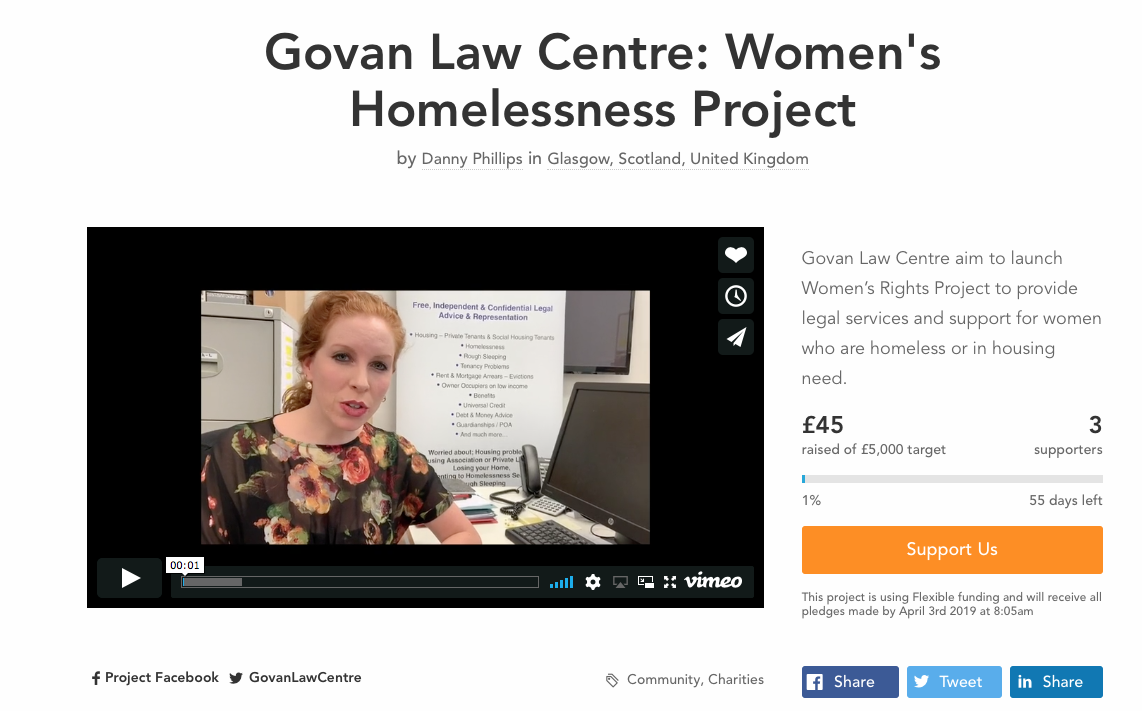 Here, Alan McIntosh, Project Manager of Govan Law Centre's (GLC) Personal Insolvency Law Unit provides a brief update on some of the innovative work of our new service.
Here, Alan McIntosh, Project Manager of Govan Law Centre's (GLC) Personal Insolvency Law Unit provides a brief update on some of the innovative work of our new service. Over the last few months we have found that there is a overwhelming unmet need for specialist advice and support for clients in Protected Trust Deeds (PTDs) and who are bankrupt in Scotland. It has found many debtors are failing to obtain appropriate advice and representation in relation to:
- Protecting their homes in PTDs and Bankruptcy; and
- Obtaining advice and representation when their PTDs are at risk of failing.
In one case Renfrewshire Law Centre working alongside with GLC's Personal Insolvency Law Unit, was able to make an offer of composition which was accepted by creditors, after an application to eject the debtors from their home had been in front of the sheriff for over a year. The PTD had been granted almost ten years earlier, despite initially only being expected to last three years.
 |
| Alan McIntosh, Project Manager |
In a similar case, granted around the same time, the £27,321
of debt the client granted the Trust Deed for grew to £52,507, due to statutory
interest of 8% per annum being added. The case is still ongoing, however, when
the client signed the Trust Deed he was advised he could re-mortgage at the end
of the three years, but was not able to. Since then, with three children still
living in the home, the mother of the family has passed away.
Another cases involved a client who had been referred onto
an insolvency practitioner by a Citizen Advice Bureaux, in 2010, after the
credit crunch, with the proposal being that the client could re-mortgage at the
end of the Protected Trust Deed and deal with their equity then. The Trustee is
now raising court action to sell the home, as the client has predictably struggled
to re-mortgage in the current financial environment and with the credit rating
they now have.
There have been other successes, however, with some lenders being prepared to show forbearance to debtors when the client’s circumstances have been explained, including that there have been disability issues in the family. However, even when these lenders are majority lenders in the bankruptcy, this has not always provided a solution and there is a number of on-going issues in such cases relating to technical procedural matters, that may still prevent a satisfactory solution being found.
The reality is personal insolvency law in Scotland is extremely complex and many debtors who are now trapped in solutions are struggling to source the specialist help they require to provide them with advice and assistance. Nearly all of Scotland’s free sector advice services are designed to advise clients on how to enter into bankruptcy and protected trust deeds, often with as we have found disastrous consequences, but there are no specialist services available to help people when things go wrong.
 We aim to publish an interim report on our findings, based
on our case work and relevant empirical evidence. In the short time our Unit has been
operating, it is clear there is a dearth of specialised advice available to
clients who are in personal insolvency solutions, despite the serious
consequences it can have for clients, risking their homes, often after they
believed they had received best advice by people that should have been helping
them.
We aim to publish an interim report on our findings, based
on our case work and relevant empirical evidence. In the short time our Unit has been
operating, it is clear there is a dearth of specialised advice available to
clients who are in personal insolvency solutions, despite the serious
consequences it can have for clients, risking their homes, often after they
believed they had received best advice by people that should have been helping
them. Sadly, all too often the initial advice given to clients was wrong, not impartial and the administration of the case has been flawed and contributed significantly to the risk of the case failing or the debtor losing their home.















No comments:
Post a Comment